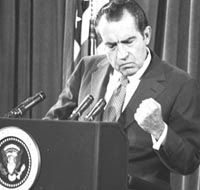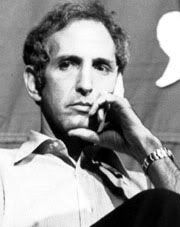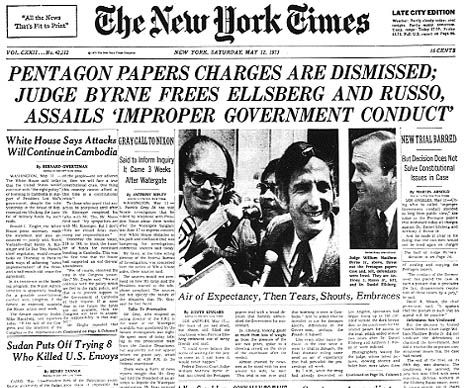This Week's
Backside
Of The
Bell Curve
Winner!
Dead, But Forever Disgraced
President
Richard
"I am not a crook!"
Nixon
President
Richard
"I am not a crook!"
Nixon

Richard Nixon meets the press
at the White House 12 days after
the Watergate break-in, June 1972
at the White House 12 days after
the Watergate break-in, June 1972
Before you get caught up in the rightwing slams against W. Mark Felt ("Deepthroat"), take a few moments to focus on Nixon (and all of his men), who caused Felt to put country over politics.
Timeline:
In 1970, after The New York Times revealed a secret bombing campaign against neutral Cambodia in Southeast Asia was being conducted as part of the American war effort in Vietnam. Following the revelations, Nixon ordered wiretaps of reporters and government employees to discover the source of the news leaks.
In 1971, the Pentagon Papers were published in The New York Times, detailing the U.S. Defense Department's secret history of the Vietnam War.
A "Plumbers" unit was then established by Nixon aides in the White House with the sole purpose of gathering political intelligence on perceived enemies and preventing further news leaks.
"Plumbers" broke into a psychiatrist's office looking for damaging information on Daniel Ellsberg, the former defense analyst who had leaked the Pentagon Papers to the press.

Daniel Ellsberg, 1974
In 1972, as part of Nixon's re-election effort, a massive campaign of political spying and 'dirty tricks' was initiated against Democrats, leading to the Watergate break-in to plant bugs (tiny audio transmitters) inside the offices of the Democratic National Committee.
June 17, 1972, as five burglars entered the Democratic National Committee offices inside the Watergate office complex in Washington. Discovered by 24-year-old night watchman Frank Wills, they were arrested at the scene by police at 2:30 a.m.
In August of 1972, President Nixon told reporters, "no one in the White House staff, no one in this administration, presently employed, was involved in this very bizarre incident."
Woodward & Bernstein write: one of the Watergate burglars, retired CIA employee James W. McCord, was actually the security coordinator for Nixon's re-election committee - a $25,000 cashier's check for Nixon's re-election campaign had been diverted to the bank account of one of the burglars - Attorney General John Mitchell had controlled a secret fund which financed political spying and dirty tricks targeting Democratic presidential candidates.
In February of 1973, the U.S. Senate established a Select Committee on Presidential Campaign Activities, chaired by Sen. Sam Ervin, to investigate all of the events surrounding Watergate and other allegations of political spying and sabotage conducted on behalf of Nixon's re-election.
March and April of 1973 saw the start of the unraveling of the coverup. On March 23, one of the five burglars convicted after the Watergate break-in, James W. McCord, informed U.S. District Judge John J. Sirica that he was being pressured to remain silent.
On April 20, acting FBI Director L. Patrick Gray resigned after admitting he had destroyed Watergate evidence under pressure from Nixon aides. Ten days later, four of Nixon's top officials resigned: Chief of Staff H.R. Haldeman; Domestic Affairs Assistant John Ehrlichman; Attorney General Richard Kleindienst; and Presidential Counsel John Dean.

Judge Byrne said the government's actions
"offended a sense of justice." He added,
"The conduct of the Government
has placed the case in such a posture
that it precludes the fair,
dispassionate resolution of
these issues by a jury."
Byrne ruled that the government's
conduct was so egregious that
the defendants could not be retried. LINK
In June, 1973, a Nixon aide revealed the President had ordered hidden microphones installed in the Oval Office in the spring of 1971 and had recorded most conversations since then on audio tape.
During the "Saturday Night Massacre" on October 20 in which Nixon attempted to fire Cox, but was temporarily thwarted as Attorney General Elliot Richardson and Deputy Attorney General William Ruckelshaus refused Nixon's order and instead resigned. Solicitor General agreed to carry out the order and fired Cox.
The White House revealed that two of the tapes no longer existed and later revealed there was an 18 minute blank gap on a crucial recording of the President and H.R. Haldeman taped three days after the Watergate break-in.
Blame Rosemary. She's just a secretary, anyway.
In November of 1973, amid all of the controversy, Nixon made a scheduled appearance before 400 Associated Press managing editors in Florida. During a feisty question and answer period he maintained his innocence, stating, "... in all of my years in public life I have never obstructed justice...People have got to know whether or not their President is a crook.
From the released tapes: "We could get that. On the money, if you need the money you could get that. You could get a million dollars. You could get it in cash. I know where it could be gotten. It is not easy, but it could be done. But the question is, Who would handle it? Any ideas on that?" -- Nixon to John Dean, March 21, 1973.
On July 24, 1974, the Supreme Court unanimously ruled that Nixon had to surrender the tapes.
On Saturday, July 27, the House Judiciary Committee approved its first article of impeachment charging President Nixon with obstruction of justice. Six of the Committee's 17 Republicans joined all 21 Democrats in voting for the article. The following Monday the Committee approved its second article charging Nixon with abuse of power. The next day, the third and final article, contempt of Congress, was approved. History Channel Link
In the days ahead, you'll hear that W. Mark Felt obstructed justice, had an axe to grind, and was a Nixon hater.
Republicans will say and do anything to make you question the profound importance of Deepthroat's actions.
Don't be seduced by their weeping, wailing, and ridiculous accusations.
Nixon was a crook.
Nixon surrounded himself with crooks.
Nixon resigned in order to avoid prosecution and conviction.
If Nixon wasn't a crook, why did his ass need pardoning?







1 Comments:
From 1974... (and my blog) --
PLAYBOY: Do you think that his resignation proves that the system works?
THOMPSON: Well, that depends on what you mean by "works." We can take some comfort, I guess, in knowing the system was so finely conceived originally -- almost 200 years ago -- that it can still work when it's absolutely forced to.
(snip)
...but in the end, the Nixon Watergate saga was written by mavericks who worked the loneliest outside edges of the system, not by the kind of people who played it safe and followed the letter of the law. If the system worked in this case, it was almost in spite of itself.
http://redhairblackleather.blogspot.com/2005/05/you-could-strike-sparks-anywhere.html
Post a Comment
<< Home